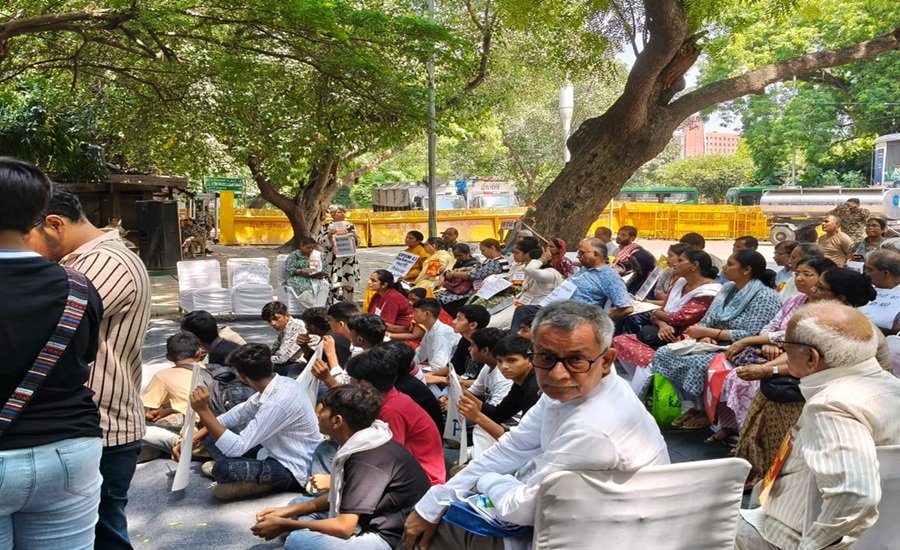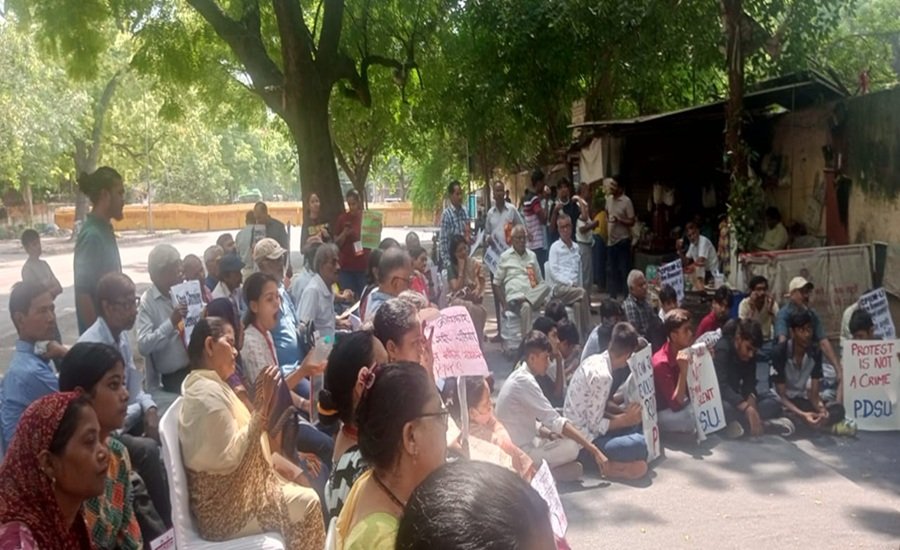Speakers recount how protest permissions in the city have become mired in bureaucracy, often ending in unexplained denials
NEW DELHI – At the iconic Jantar Mantar in the national capital on Tuesday a cluster of banners fluttered under a hazy sky as academics, trade union leaders, student activists, and rights defenders gathered for what they called an “urgent conversation on democracy.”
The event — titled “Convention Against Shrinking Democratic Space” — brought together nearly two dozen organisations alarmed by what they described as a systematic erosion of the right to protest in the country’s capital.
“We are witnessing the slow strangulation of people’s voices,” said Comrade Mrigank, spokesperson for the Delhi Committee of CPI(ML) New Democracy, opening the meeting. “Jantar Mantar, once a vibrant forum for dissent, has been turned into a fortress.”

The speakers’ list reflected the breadth of concern: Prof Madhu Prasad of the All India Forum for Right to Education (AIFRTE), Prof Nandita Narayan of the Democratic Teachers’ Front (DTF), Deepti from the National Federation of Indian Women (NFIW), Animesh Das of the Indian Federation of Trade Unions (IFTU), Manager Chaurasia of the All India United Trade Union Centre (AIUTUC), Vimal Trivedi of CPI(ML) Massline, Vertika of the People’s Union for Civil Liberties (PUCL), Vikas from Jan Hastakshep, Shreya of the Collective, Vivek (MEK), Yogesh (RWPI), Poonam (PMS), another Yogesh (IMK), Ritu (AIMMS), Saurav (PDSU), and Ashis (NBS).
Each recounted how protest permissions in the city have become mired in bureaucracy, often ending in unexplained denials.
Participants described a sharp shift in how authorities manage the country’s most famous protest site. Once a relatively open stretch where citizens could march, chant slogans, and hold sit-ins, Jantar Mantar has, they said, been transformed into a walled enclosure with metal barricades and police checkpoints.
“Today, even a small gathering feels like entering a cage,” remarked Vertika of PUCL, gesturing toward the barricades that now line the area.
Under current practice, groups must give 10 days’ advance notice and submit written applications to stage demonstrations — a process activists say defeats the very idea of a spontaneous or timely response to government policies or court judgments. Organisers are asked for extensive personal details, the size and purpose of the event, and sometimes even the names of all attendees.
“By the time you get a reply — if you get one at all — the moment has passed,” said Prof Nandita Narayan. “The government knows this. It’s a way to render protests meaningless.”
Blanket Ban
The discussion also focussed on a wider legal framework that has increasingly hemmed in public assemblies. Delegates condemned the perpetual ban on protests under Section 163 of the Bharatiya Nagarik Suraksha Sanhita (BNSS) across the New Delhi district.

That measure, intended as a security safeguard, has effectively prohibited any demonstrations near central or state government offices. “Citizens cannot even march to submit a petition at North Block or Rail Bhawan,” said Vikas of Jan Hastakshep. “The route between people and power has been blocked.”
Trade union leaders warned that restrictions are spreading into industrial areas and workplaces, undermining labour rights. “When contract workers try to protest delayed wages at a government office, police threaten them with arrest for violating prohibitory orders,” said Animesh Das of IFTU.
Several speakers lamented that iconic democratic processions — once integral to Delhi’s public life — are now treated with suspicion or banned outright. International Women’s Day rallies, May Day marches, and Bhagat Singh memorial processions have faced repeated curbs or last-minute cancellations.
“These events are not law-and-order problems; they are traditions of freedom,” said Deepti of NFIW. “To erase them is to rewrite the city’s history of struggle.”
Constitutional Freedoms
The gathering concluded with the adoption of a memorandum addressed to Lt. Governor VK Saxena. The document urged the administration to replace elaborate permission systems with a simple prior intimation requirement for protests at Jantar Mantar and in all Delhi districts and to withdraw sweeping prohibitory orders that place entire districts — particularly New Delhi — under a constant ban on demonstrations.
“Democracy cannot survive on paper alone,” the memorandum read. “It must be visible in our streets and accessible to our people.”
Though convention focussed on Delhi, many speakers linked the issue to a national climate of shrinking civic space. They cited restrictions on student gatherings, crackdowns on farmers’ protests, and arrests of activists under stringent laws as part of a larger trend.
“This is about more than one venue,” said Prof Madhu Prasad. “When the state fears its own citizens’ voices, it chips away at the foundations of democracy itself.”
The organisers pledged to continue pressing for reforms. “We will not allow Delhi to become a city where dissent dies in paperwork,” said Mrigank, promising to follow up with authorities and mobilise support from teachers, students, and workers across the capital.

